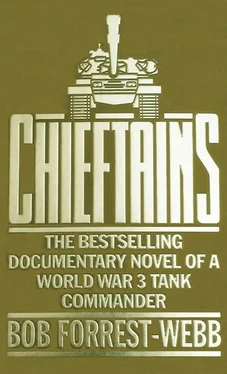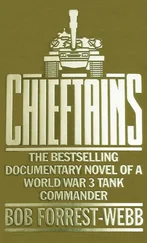He moved cautiously, avoiding the skyline and working his way past the blazing remains of the Soviet T-62 until he found better cover in a gorse thicket on the ridge.
Podini was staying so close that when Browning hesitated the gunner crawled into him. He signalled for him to wait while he slid himself on his belly for the last meter.
He caught his breath as he pushed aside the gorse. A regiment of Soviet armour had reformed on the farmland below him less than two thousand meters away. Thirty or forty tanks, T-80s and T-60s. Beyond, a battery of self-propelled guns; nearby, three rows of armoured personnel carriers. The tanks were moving, swinging away westward, the roar of their engines drowning out the sounds of battle. The river, six hundred meters to the right, had been bridged by a pair of GSP ferries, and field engineers were already constructing a second bridge fifty meters downstream, protected by two Quad self-propelled anti-aircraft vehicles and an SAM battery, lightly camouflaged near the riverbank. There was no doubt the Soviet commanders had anticipated their rapid advance, for there was already a queue of vehicles waiting to cross; heavy cargo carriers, pillow tanks loaded with fuel, artillery tractors and their guns.
How far had they advanced in the hour or two since the first dawn battle had started? Browning studied his watch, wondering for a moment if it had been damaged. It showed 16.30 hours. Noon had passed unnoticed… eleven hours since it had all begun! His mind was momentarily confused. They called it battle amnesia didn’t they? The real and the unreal blended together, time compacted and loot, incidents jumbled. It was the reason pilots were debriefed the instant they landed; minutes law, as their minds relaxed after long, intense concentration, the memories were no longer accurate.
Ten hours; almost eleven. The Soviet spearhead could already be twenty kilometers into NATO territory, now they had penetrated the defences… perhaps even further. He remembered Captain Harling’s words: ‘We’re about to counterattack their flank.’ Flank! Had the captain lied? Was it an attempt by the squadron to break out of their encircled position… an attempt which had failed? The amount of materials the Russians were accumulating east of the river seemed to indicate they felt the bridgehead was secure, and for the first time that day Browning could see no NATO aircraft in the skies above.
Podini was waiting nervously, his Remington so tightly gripped in his hand the knuckles were white, his body pressed hard beneath the gorse.
‘What did you see?’
‘Half the Commie army. The best part of a full tank regiment, artillery and logistics. The whole darned lot down there in the fields… bridges, combat engineers.’
They returned to the Abrams by a more direct route down the cratered slope. The plain towards Gunthers where the carcasses of the squadron lay had the air of a bone-yard about it, reminding Browning of photographs he had seen of drought-sticken African deserts scattered with the dry skeletons of dead animals. For once Podini was silent, keeping his thoughts to himself as they scrambled down the hillside.
Adams and Ginsborough must have been watching through the lenses, for as the two men returned they climbed from the hull and waited for Browning to speak, their faces begging him to say something encouraging. Browning dropped his Remington back into its holster, squatted beside the Abrams and rested against the crippled track. The men stood looking down at him anxiously. He spoke slowly. ‘Just over that hill is the end of the war for us. All we have to do is to walk slowly around there, with our hands up. No more shelling or bombing… no more rockets or napalm.’ They remained silent. ‘One thing I ought to tell you. The Russians took a lot of Germans prisoner in the ’39–’45 war; the last ones they released didn’t get home until ’57. Some never made it at all… they used them as labourers in the Arctic Circle; maybe some of them are still alive, still up there. They’d be about sixty-five years old, could be even seventy.’
Adams said, ‘We’ve got your point.’
‘Maybe we could walk out, travel at night, try to reach the lines,’ suggested Ginsborough.
‘Could be,’ agreed Browning. ‘We might still have to try. Only the way I see it, we have a problem. The Russians could be advancing faster than we can walk. They do thirty kilo meters a day in their vehicles, we do ten every night on foot. The end of a week, and we’re further behind the lines than when we started.’
‘They’ll be stopped somewhere, maybe at the Fulda river,’ said Podini, hopefully.
‘I guess we ought to get Utah mobile.’ Adams ran his hand along the taut links of the track.’ ‘All I want is a gas cutter to get this sonovabitch back on the road. I ain’t built for walking, and my idea of a vacation isn’t ten years down some old salt mine.’
‘It occurred to me when I was coming down the hill that there’d be everything we need in Gunthers. There’d be a garage there; I’ve seen one. The stuff we need could be in the wreckage.’ Browning was deliberately avoiding giving the men orders. This was a difficult situation and it was going to get worse. It was essential he had a hundred per cent backing from the crew, and that would be more certain if they developed his ideas themselves.
Podini nodded. ‘Maybe we could do it after dark.’
‘Hole up until then,’ added Ginsborough.
‘They might send out patrols… pick us up.’ Adams looked up at the hull of the XM1. ‘Baby ain’t easy to miss.’
‘I think we’ve got a chance.’ Browning pushed himself to his feet. ‘The Russians’ main concern is the front line. They’ll use everything they’ve got up there, and do their tidying afterwards. I think we can make Utah look worse than she is… enough to fool a helicopter. Let’s get to work. Gins, dismantle your machine gun and get yourself up on the ridge. Keep your head down, it’s busy over there. Pino, you and Mike go and get a few bodies…’
‘Bodies!’ Podini looked stunned.
‘Bodies the man said,’ shrugged Adams. ‘You made ’em, what you complaining about? I guess they’re for decoration!’
Browning leant some of the broken tree branches against the hull of Utah, then lowered her gun until the barrel was fully depressed — it made her look forlorn. He opened all the hatches. There was a twisted sheet of metal a few meters away, part of the shield of some wrecked field-gun. He wedged it against the right track. There was already an abandoned look to the XM1.
Podini was examining the bodies of the men he had killed sixty meters to the right of the Abrams. They lay amongst the wreckage of their equipment, their bodies torn and mangled. It was the first time he had seen the effect of a shell burst on a human target at close quarters; it was horrifying. He wanted to throw up, but kept swallowing the acid bile that rose in his throat. Bodies, Browning had said. Jesus, there didn’t seem to be one that was anywhere near complete! He’d seen his grandmother when she had died, but she had looked as though she were sleeping… a little yellow maybe, parchment-skinned, but only sleeping. These men, the bits of them, were wide-eyed, if they had any faces left at all; their mouths grinned through bloody smashed teeth and their bodies were grotesque, shattered, dismembered.
There was one partly covered by the loose stone of the wall. Podini could see both arms, its chest, head. He bent over it, biting his lip.
‘Mike… Jesus Christ! Mike, over here.’
Adams was beside him, quickly. ‘What the hell?’
‘This guy ain’t dead. I saw his eyes move. Feel his pulse will you…’
Adams knelt beside the man and stared at him for a few moments, then put the hard outside edge of his hand against the man’s neck. He leant forward and pressed down with all his body weight.
Читать дальше












